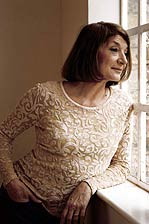
September 10, 2006, by Peter Kirwan
The Rape Of Lucrece (RSC) @ The Swan Theatre
It’s a bit hard to know whether to call this an event or a production- it IS one of the fifty-four Complete Works productions, but as it was an hour and fifteen minute workshopped reading, it felt more like an event, a curio, than a full production.
‘The Rape Of Lucrece’, for anyone who doesn’t know, is a narrative poem detailing the rape of Lucrece by Tarquin, the last king of Rome, and her subsequent suicide and the running out of the kings, resulting in the birth of the Roman Republic. The bulk of it is taken up with Tarquin and Lucrece’s musings on the events, and to that end it lends itself well to a dramatic reading.
Five cast members took on the text, each narrating but also taking on particular parts. The absolute highlight was Jane Lapotaire’s Lucrece, returning to the company to just do this workshop. In her mammoth soliloquy that dominates the middle third of the poem, she held the stage by herself and completely mesmerised the audience- despite reading her lines from the script, her voice and considered actions were powerfully emotive and expressed an impressive range of emotion as Lucrece meditated and railed against her violation.
Ariyon Bakare, taking on Tarquin, gave an equally impressive performance in one of the most horrific roles, the considered but not entirely evil rapist. His confusion and indecision was gripping, just as the description (not enacted) of the rape itself.
The three other cast members played a narrative chorus, narrating and watching the action intently. For those interested, Rob Carroll (Trebonius from ‘Caesar’) played Collatine, David Fielder (Pandulph in ‘King John’) played Brutus and Patrick Romer (Montague in ‘Romeo’ and the Friar in ‘Much Ado’) played Lucius, in addition to their narrative parts. Between the three of them they split the narration, keeping the text pacey and interesting, and fascinating to listen to.
According to the programme, Gregory Doran had tried several approaches to the play, experimenting with masks, mime and music. In the end, however, they approached for a straight reading of the play, with simple movements to bring out the power of the words and a fantastic reading of the text. It’s sometimes easy to forget, in an ensemble company with such technical power at its disposal, that an actor simply standing on stage and delivering lines powerfully can be as spellbinding as any production, and that’s something this reading proved beyond doubt.
No comments yet, fill out a comment to be the first

Leave a Reply